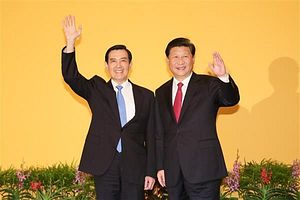The data is in: less than a week after the meeting between Taiwanese President Ma Ying-jeou and Chinese President Xi Jinping, a plurality of Taiwanese believe Ma does not reflect their views and that he failed to defend Taiwan’s sovereignty and dignity.
Any objective observer would agree last week’s summit was a historic event. However, the lack of progressive or meaningful joint agreements between the two, combined with merely the reiteration of preexisting policies, reveal the domestic interests that drove Ma and Xi to hold the meeting and the desperation that forced Ma to conduct it as he did. Unfortunately for all parties involved, the Taiwanese response to the meeting has thus far not only failed to validate Ma’s political gamble, but also underlined the political weakness of his bargaining position.
With Taiwanese presidential elections approaching in January, Kuomintang (KMT) President Ma used his meeting with Xi Jinping as a way of making his mark. Besides attempting to leave a legacy in the final months of his presidency, Ma used the summit as an attempt to drum up much needed KMT support. Last year’s midterm elections were hugely victorious for the Democratic Progressive Party (DPP), a result that was viewed as a “vote of no confidence” for Ma’s presidency. Moreover, the KMT was lagging 20% behind DPP candidate Tsai Ing-wen in the presidential race prior to the summit. This is interpreted by many as a reflection of dissatisfaction with the Taiwanese economy as well as increasing support among the Taiwanese people to maintain their (separate) sense of national identity. In a recent poll by the Taiwan Braintrust, nearly 90 percent of the population in Taiwan reported identifying themselves as “Taiwanese” rather than “Chinese.” This does not bode well for the China-friendly KMT.
By meeting with Xi, Ma attempted to show the Taiwanese people that the KMT is the party to elect for serious steps in Taiwanese foreign policy. Ma used the spotlight provided by the summit to underline the progress he conducted during his almost eight years as president. “Over the past seven-plus years, the two sides have concluded 23 agreements, and have created 40,000 student exchanges, 8 million annual cross-strait visits, and 170 billion USD in two-way trade,” he said.
For Xi Jinping, the meeting posed a chance to calm the Taiwan electorate’s anxiety about the KMT’s friendliness with China. Xi treated Ma with an unprecedented amount of dignity. Though the protocol did not nearly reach the level of respect one would expect from a summit between any other two national leaders (the two referred to each other as Mister rather than President), Ma and Xi behaved largely as equals, splitting the check and stowing both national flags. Xi even renewed his willingness to allow Taiwan to join the Asian Infrastructure Investment Bank, though under the “appropriate” title.
Ma has attempted to use a meeting with his Chinese counterpart as a way of boosting his popularity with the Taiwanese people before. By granting him this meeting, Beijing recognized Ma is in need of some credibility. As a senior Asian diplomat reported to The New York Times, “Mr. Xi must be looking to do Mr. Ma a favor, he has been asking for this for a long time.”
However, despite these efforts to dignify the meeting, the leaders were unable to produce any groundbreaking or even mildly progressive agreements. Rather, Ma and Xi spent most of their statements reiterating their commitment to longstanding policies as well as echoing old language. In the press conference following his meeting with Xi, Ma commented, “we will continue to consolidate the 1992 Consensus of ‘one China, respective interpretations’ as the basis for relations, and maintain the status quo of peace and prosperity.” Furthermore, Xi reinforced the idea of Taiwan and China as long lost family members. “We are brothers who are still connected by our flesh even if our bones are broken,” he said.
This lack of deliverables underlines the true purpose of the Ma-Xi summit: to boost the legitimacy of the KMT and prevent an aggressive DPP-controlled Taiwan.
Unfortunately for Xi and the PRC, it is possible the political stunt will actually hurt the KMT in the upcoming elections more than help it. Upon hearing of the secretly constructed meeting, strong opposition to the meeting exploded among the Taiwanese people. Protestors tried to break into Taiwan’s parliament building in Taipei. The Taipei Times published an article on Monday with the title, “Ma sells out Taiwanese to secure his place in history.” DPP candidate Tsai released angry response to the summit, claiming, “Together with the Taiwanese people, we will use democracy to reverse the damage caused by the Ma-Xi meeting.”
It would appear she has democracy on her side. A survey conducted on Sunday by the Cross-Strait Policy Association exposed that 48.5 percent of the 1,014 Taiwanese aged 20 or older polled were dissatisfied with Ma’s achievements at his meeting, whereas 39.6 percent reported satisfaction. Furthermore, while Ma and Xi may have attempted to send a message to the next president of Taiwan, 48.3 percent of those sampled did not believe the future Taiwan leader was obligated to follow the agreements reached during the meeting. Moreover, not only did Tsai maintain her lead in the polls in the face of the Ma-Xi meeting, she increased it, from 45.2 percent last month to 48.6 percent this month. Her KMT challenger Eric Chu fell from 21.9 percent to 21.4 percent.
Perhaps the most concerning part of Ma’s remarks on the summit was the glaring lack of recognition by the Taiwanese president of Taiwanese identity. In an editorial published in the Taipei Times on Thursday, the author agreed, “By denying Taiwan’s very existence, Ma has run counter to mainstream public opinion, and if that does not undermine democracy, what does?” The answer lies in the January 2016 presidential elections.
Phoebe Benich is a Researcher in the Asia Pacific Security Program at the Center for a New American Security

































